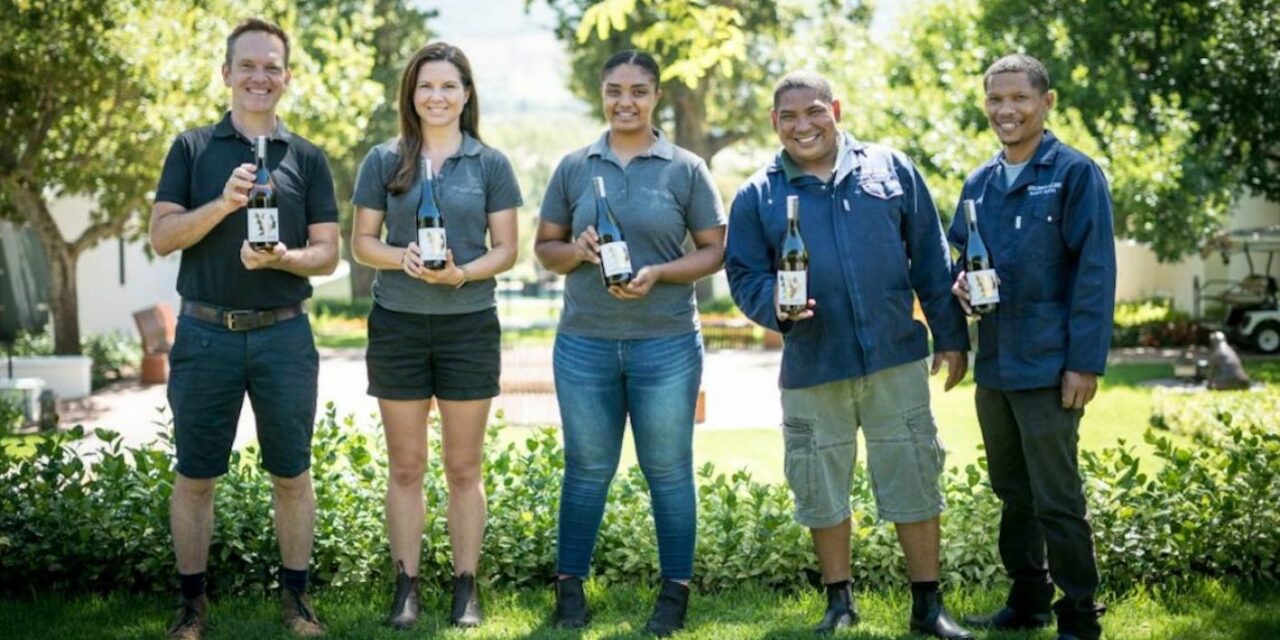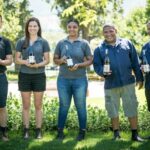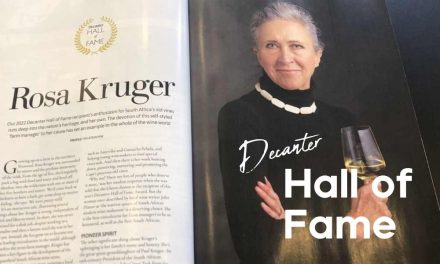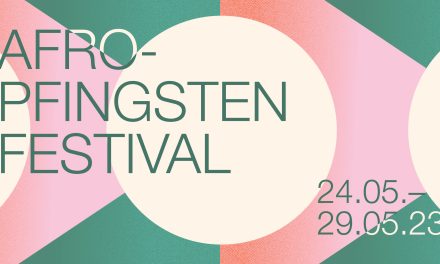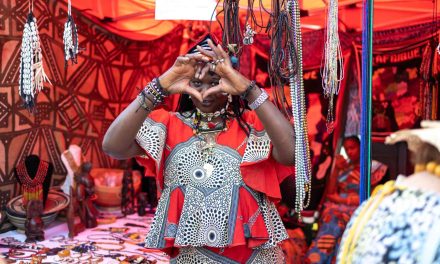Malu Lambert admires the spirit of a new staff-owned project by Mullineux, with help from Waitrose. The Great Heart team are pictured above, left to right, Chris and Andrea Mullineux, Gynore Fredericks, Baron Willemse, and Johan Waterboer.
Giving back in South Africa
By Jancisrobinson.com
Although it resulted in commercial disasters such as bringing wine exports to a grinding halt, the pandemic has also sped certain things up.
We’ve all been forced to make choices in this past year that have affected both our work and personal lives. We’ve all had to go deeper. In the eternal battle between good and evil some have revealed themselves as crisis opportunists, using the pandemic as a tool for their own nefarious ends – many workers have been laid off, with COVID-19 being the convenient excuse – or to profit from it. Let’s not get into the PPE scams and black-market cigarettes …
While others, those with wings, have shown incredible generosity of spirit. In every sector there have been acts of grace, from breweries that were shut down during alcohol bans that turned their tanks over to soup-making for the impoverished, to the country’s chefs who cooked daily for hungry children, tirelessly raising funds to do so – and to the countless positive initiatives driven by the wine industry.
Adding their own wings to the cause is the well-respected Mullineux & Leeu Family Wines, who have recently launched a staff-empowerment project called Great Heart Wine. The range currently consists of Great Heart Swartland Chenin Blanc and Great Heart Swartland Red Blend, sold by Waitrose in the UK at £14.99. A Stellenbosch Chardonnay and Cabernet Sauvignon are billed to join the series soon. The label, by South African artist Jaco Sieberhagen, depicts the African wagtail, chosen as in Africa the bird symbolises help.
Chris Mullineux explained, ‘Andrea and I have for some time been thinking how we can make a meaningful difference to our employees’ lives. COVID galvanised us into action. We investigated different businesses and came to the conclusion that the best would be to focus on what we know how to do well, turning great grapes into beautiful wine. We also wanted to keep it as simple as possible, so the concept was distilled down to starting a separate company that is 100% owned by our staff. The company Great Heart Wines owns the brand and uses the infrastructure of Mullineux & Leeu Family Wines to make and sell wine. The profits are 100% divided between our staff members who are the shareholders. Much credit must go to Waitrose for getting behind the project from the concept phase.’
Any employee who has worked full-time for Mullineux & Leeu Family Wines for more than two years automatically becomes a shareholder of Great Heart. So far 21 staff members have qualified.
‘Andrea and I are involved as mentors with the idea of lending a guiding hand when needed. In the winery for example, Andrea follows more of a cellarmaster role for Great Heart with Gynore Fredericks as lead winemaker.’
Gynore, whose day job is being the Mullineuxs’ assistant winemaker, is apparently enjoying having her own creative outlet and plans to produce some special lots for Great Heart in the future. ‘The main thing though is seeing people grow around me. Some come from very challenging backgrounds and I believe Great Heart will make a big difference to us all’, Gynore told me.
When it comes to the winemaking Gynore is sticking to the winery’s hands-off approach. ‘The wines are made in the same way we do our Mullineux and Leeu Passant wines, that being natural fermentations, minimal additions and aiming for wines with a sense of purity, balance and a sense of place.’
The Chenin Blanc (see Jancis’s tasting note) is made from two parcels of Paardeberg bush vines with 85% fermented in tank and 15% in older barrels. The Red Blend is comprised of 51% Syrah, 34% Tinta Barocca and 15% Cabernet Sauvignon with 50% whole-bunch fermentation for the Syrah and Tinta Barocca. The wine is then matured for 18 months in older oak barrels and foudres.
I recently tasted both wines. The Chenin is white-fruited with peach and hints of litchi skin, cut green apple, citrus-toned and a touch saline. The acid is fresh and bright, lancing right through. There’s a certain austerity to the wine, which shows promise for some evolution.
With the red blend there’s a real point of difference. A spicy, wild edge brought on by the Tinta, that characteristic Swartland funk, brightened and polished by the portion of whole cluster. There’s a succulent mix of red and black fruits on the palate, framed by a fine-boned skeleton, likely the Cab’s contribution (see also Jancis’s tasting note).
These are not challenging wines; in fact, they’re extremely drinkable. And that I think is the point – the more bottles of Great Heart that are opened, the more this fledgling company can grow, changing lives as it does so.
This is not the first project of its kind in the country. Adama Wines, which sits under the umbrella of Bosman Adama, is a multi-ownership business initiated by Bosman Family Vineyards in Wellington. In 2009 they gave 260 permanent workers shares in 430 hectares (1,063 acres) of vineyard land to produce the range. It is cited as the largest land-reform transaction in the history of the South African wine industry.
Another groundbreaking example in Wellington is Thokozani, a shareholding model conceived by Diemersfontein. In 2007 a workers’ forum was established with 35 staff members of the estate receiving shares in the company. They were allocated on the condition that they stayed and worked on the farm for at least five years. The majority (80%) belongs to the workers’ forum, while Diemersfontein retains a 20% shareholding. The other arm of the company is Thokozani Properties, a subdivision on the Diemersfontein estate with a number of cottages for accommodation purposes. A total of 85 staff members are now involved with the company.
Then there’s the successful Compagniesdrift Wines, a winery as well as a bonded warehouse and bottling facility that was created in 2015 for farm workers from the famed Stellenbosch properties of Meerlust, Vriesenhof and Ken Forrester. There are now 72 beneficiaries. The Myburgh Family Trust, owners of Meerlust, spearheaded the project with The Meerlust Workers’ Trust, which now also owns Compagniesdrift.
These are some of the big stories but there many other initiatives, quite apart from the Cape Winemakers Guild Protégé Programme, such as that outlined by winemaker (and past protégée) Kiara Scott. Her employers, Brookdale of Paarl, help their staff acquire driving licences – a small yet impactful policy. Never underestimate the freedom a set of wheels can give you.
These acts of transformation made me think of the Imvini Wethu wine, a Cape blend made in association with the Cape Winemakers Guild’s (CWG) Protégé Programme under supervision of Andrea Mullineux, CWG Chair, and the Old Vine Project. The wine was created specifically for the German market by a group of German business owners, importers and wine-industry professionals. Proceeds from each bottle sold will be used for the protégé programme as well as for training within the Old Vine Project to expand their vineyard workers’ skills.
Imvini Wethu’s slogan surely sums it up when it comes to what we in South Africa call upliftment programmes, big or small: ‘alone we can do so little, together we can do so much’.

